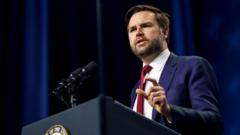Vance’s recent visit to Dachau sparked debate over American political influences on rising extremist sentiments in Germany, particularly involving the Alternative for Germany party.
Trump Administration's Controversial Stance on Political Extremism in Germany

Trump Administration's Controversial Stance on Political Extremism in Germany
Vice President JD Vance and Elon Musk's remarks on Nazism and extremism challenge Germany’s historical perspectives.
In a recent visit to Germany, Vice President JD Vance laid a wreath at the Dachau concentration camp, an act he described as a profound personal experience that solidified his understanding of the Holocaust's profound evil. Following his visit, he expressed gratitude for witnessing this part of history firsthand. The vice president's comments came at a time of heightened political tension as Germany prepares for upcoming parliamentary elections.
However, Vance's remarks and actions were met with skepticism from German leaders, who accused him and the Trump administration of fostering an environment where extremist viewpoints can thrive. This concern is underscored by the rise of the Alternative for Germany (AfD), a political party noted for its controversial stances, including downplaying the significance of Nazi atrocities. The AfD has garnered considerable support, securing approximately 20% in opinion polls leading up to the elections, although mainstream political parties refuse to engage with it.
The party's reputation has been marred by links to extremist ideologies, with German intelligence classifying parts of its membership as radical. Reports indicate that some AfD members have participated in discussions targeting societal minorities, including proposals for the deportation of not only asylum seekers but also naturalized German citizens.
As Vance represented American interests in Germany, the juxtaposition between historical remembrance and contemporary political dynamics has sparked a complex dialogue regarding the legacy of Nazism and the future direction of political extremism in Europe.
However, Vance's remarks and actions were met with skepticism from German leaders, who accused him and the Trump administration of fostering an environment where extremist viewpoints can thrive. This concern is underscored by the rise of the Alternative for Germany (AfD), a political party noted for its controversial stances, including downplaying the significance of Nazi atrocities. The AfD has garnered considerable support, securing approximately 20% in opinion polls leading up to the elections, although mainstream political parties refuse to engage with it.
The party's reputation has been marred by links to extremist ideologies, with German intelligence classifying parts of its membership as radical. Reports indicate that some AfD members have participated in discussions targeting societal minorities, including proposals for the deportation of not only asylum seekers but also naturalized German citizens.
As Vance represented American interests in Germany, the juxtaposition between historical remembrance and contemporary political dynamics has sparked a complex dialogue regarding the legacy of Nazism and the future direction of political extremism in Europe.























